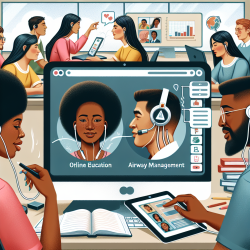Improving Your Online Therapy Skills: Insights from Airway Management Research

Are you looking to enhance your online therapy skills? Drawing insights from diverse fields can be incredibly beneficial. Let's delve into the updated consensus-based recommendations for managing difficult airways, as published by the Canadian Airway Focus Group. This article not only provides valuable information for medical practitioners but also offers insights that can be applied to online therapy, particularly in the realm of special education.
Key Recommendations and Their Application in Online Therapy
The Canadian Airway Focus Group's research emphasizes the importance of planning and implementing safe management strategies for patients with anticipated difficult airways. Here are some key takeaways and how they can be applied to online therapy:
1. Thorough Evaluation and Planning
The research stresses the need for a documented strategy based on thorough patient evaluation. In online therapy, this translates to:
- Conducting comprehensive assessments of students' needs and abilities.
- Developing individualized therapy plans tailored to each student's unique requirements.
2. Predictive Indicators
Just as medical practitioners look for predictors of difficulty, online therapists should:
- Identify potential challenges that students might face in a virtual learning environment.
- Use these predictors to inform therapy strategies and interventions.
3. Flexibility and Adaptability
The ability to adapt to unexpected difficulties is crucial in both fields. For online therapists, this means:
- Being prepared with alternative strategies and tools if the initial plan does not work.
- Continuously monitoring and adjusting therapy sessions based on real-time feedback.
4. Communication and Teamwork
Effective communication and teamwork are essential in managing difficult airways. Similarly, online therapists should:
- Maintain open lines of communication with students, parents, and other educators.
- Collaborate with colleagues to share insights and strategies for overcoming challenges.
5. Use of Technology
The research highlights the use of advanced tools like video laryngoscopy for better outcomes. In online therapy, leveraging technology can enhance the effectiveness of sessions:
- Utilize interactive tools and platforms to engage students.
- Incorporate multimedia resources to make therapy sessions more dynamic and effective.
Encouraging Further Research
The Canadian Airway Focus Group's recommendations are based on extensive research and expert consensus. Online therapists can benefit from a similar approach by:
- Staying updated with the latest research and developments in online therapy and special education.
- Participating in professional development opportunities and continuing education courses.
Conclusion
By applying these insights from airway management research, online therapists can enhance their skills and provide better support to their students. Remember, thorough evaluation, predictive indicators, flexibility, effective communication, and the use of technology are key components of successful therapy.To read the original research paper, please follow this link:
Canadian Airway Focus Group updated consensus-based recommendations for management of the difficult airway: part 2. Planning and implementing safe management of the patient with an anticipated difficult airway.
Citation: Law, J. A., Duggan, L. V., Asselin, M., Baker, P., Crosby, E., Downey, A., Hung, O. R., Kovacs, G., Lemay, F., Noppens, R., Parotto, M., Preston, R., Sowers, N., Sparrow, K., Turkstra, T. P., Wong, D. T., & Jones, P. M. (2021). Canadian Airway Focus Group updated consensus-based recommendations for management of the difficult airway: part 2. Planning and implementing safe management of the patient with an anticipated difficult airway. Canadian Journal of Anaesthesia, 68(9), 1405-1436. https://doi.org/10.1007/s12630-021-02008-z










